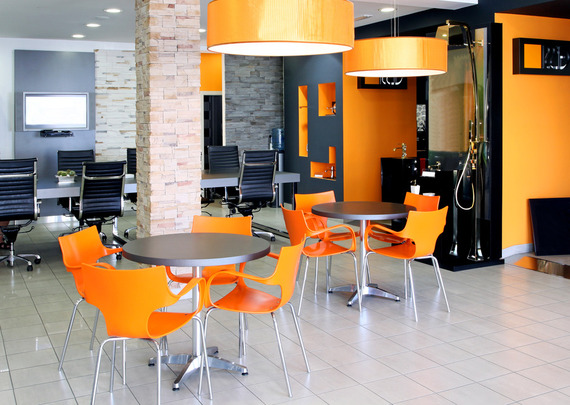
In the early stages of building a new business, founders must be able to put every dime they can into growing their startups. One main way to accomplish this is by saving as much money as possible on monthly expenses. When founders must put a great deal of money into equipment, monthly office space rent, and employees, there's less money left over to spend on marketing and networking.
"These days, some of the best startups are built as distributed workforces," says Tom Serres, Founder of DVTorque, an entrepreneur-in-residence program in Silicon Valley. "At the end of the day, you build to win - where you are and how your office looks matters only in the sense of achieving strategic goals for success."
A dedicated office space will cost $10-$50 per square foot each month, depending on the cost of living in the city where the entrepreneur is located. Instead of spending tens of thousands of dollars per month on rent, there are alternatives new business owners should consider.
1. Home Office. Most small business owners start at home, generating ideas and interacting with potential clients using personal equipment. With so many tech tools available to disguise the fact that they aren't working in an office, a business owner can easily work from a home office for years before making the switch. Businesses can hire virtual receptionists, set up a local mailbox, and even arrange to use a shared conference room center for client meetings. For best results, set a daily work schedule and stick to it, letting others in your life know that you need to keep structured work hours to be successful. Join local networking groups to fulfill your need to interact with others to help get the word out about your business.
2. Coworking Spaces. As technology has made it easier to start a small business, coworking spaces have arrived to fill the need for affordable workspace for new businesses. Fees are more affordable than traditional office leases and some coworking spaces allow business owners to rent space for a certain number of days each month, rather than committing to daily use. These spaces usually offer conference rooms, break areas, and occasionally even amenities such as fitness center access. Best of all, participants usually have access to other startup founders, with whom they can network and possibly even form partnerships to help each other grow. Some coworking centers host networking events and workshops to encourage a sense of community among members.
3. Executive Suites. Executive suites are custom-built for the needs of small business owners. Depending on the location, business owners will often find that the rental of one small space gives them access to a wide variety of amenities. In addition to sharing conference rooms and break areas with other small business owners, renters often have a lobby with a receptionist who can take phone calls and greet guests. In some locations, administrative help is available with data entry, mailings, and other day-to-day duties. For a new business owner who can't yet afford to pay a team for administrative support, these amenities could be a huge help. One of the best things about executive suites is their scalability. Often businesses can easily move from a small space to a bigger space as their needs change.
4. Incubators and Accelerators. Incubators and accelerators provide small business owners the support they need as they seek funding, refine their business ideas, and search for a way to get their new startups off the ground. Another benefit is office space, which is provided as part of participation in one of these programs.
Some startup programs also offer administrative support along with the access to mentorship and networking they'll receive. These programs generally last only six months to a year, but the support businesses get during their participation can give them just the head start they need to move on to an executive suite, coworking space, or home office.
Bottom line:
Startup founders have several options when it comes to affordable office spaces. Not only will they find a less expensive alternative to office leases, but they'll also have access to amenities and networking opportunities that they might not have in a traditional space. Founders must shop various options and find the one that fits their needs.
